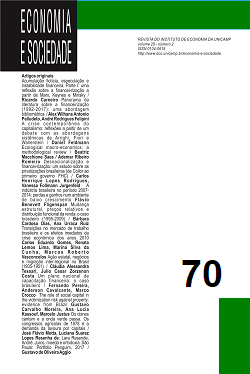Abstract
Fiscal policy played a leading role in the debate on the trajectory of the Brazilian economy in the first half of 2010 to explain the economic slowdown and subsequent recession, both in orthodox and heterodox contributions. Orthodox economics points to uncontrolled public spending as being responsible for the fiscal deterioration, which would have led to worsening agents' expectations and falling investments. Heterodox economics, in a roughly opposite interpretation, points to an inflection of fiscal policy that, reducing spending, particularly investment, at the beginning of the decade, would have compromised the policy-inducing capacity in a demand-led growth model. This article aims to empirically evaluate these explanations. In addition to a descriptive analysis of the data, we propose a vector autoregression (VAR) model to examine how the fiscal policy elements pointed out by each of the perspectives discussed here have affected economic growth. In particular, we aim to investigate whether they are able to explain the downturn and the recession in the period analyzed. The results indicate, contrarily to the orthodox view, that spending did not skyrocket compared to previous governments, and that movements in output tend to precede changes in the fiscal outcome. They also point to the importance of public investment in determining the pace of activity, confirming a central element of the heterodox approach. However, by revealing that up to 2014 public spending continued to grow, indicates the insufficiency of the heterodox thesis to explain the slowdown in previous years and the depth of the subsequent recession. Given this, we present additional explanatory elements to understand the period.
References
BARBOSA FILHO, F. H. Crises econômicas e política de 2015: origens e consequências. Conjuntura Econômica, v. 69, n. 9, set. 2015.
BARBOSA FILHO, F. H.; PESSOA, S. Desaceleração recente da economia. In: CENTRO de Debates de Políticas Públicas. Sob a Luz do Sol, uma agenda para o Brasil: a política econômica do governo Dilma: a volta do experimentalismo. São Paulo: CDPP, 2014. p. 15-30.
BIASOTO JR., G.; AFONSO, J. R. Política fiscal no pós-crise de 2008: a credibilidade perdida. In: NOVAIS, L. F.; CAGNIN, R. F.; BIASOTO JR., G. A economia brasileira no contexto da crise global. São Paulo: Fundap, 2014. p. 251-279.
BORGES, B. A diferença entre os efeitos da Lava-Jato no curto prazo e no médio e longo prazo. Blog do IBRE, FGV, 2018.
BRESSER-PEREIRA, L. C.; NASSIF, A.; FEIJÓ; C. A reconstrução da indústria brasileira: a conexão entre o regime macroeconômico e a política industrial. Revista de Economia Política, v. 36, n. 3 (144), p. 493-513, jul./set. 2016.
DWECK, E.; CHERNAVSKY, E.; CHAVES, M. O modelo de desenvolvimento brasileiro: análise de seus fundamentos e o papel das macropolíticas federais. In: CONGRESSO INTERNACIONAL DEL CLAD SOBRE LA REFORMA DEL ESTADO Y LA ADMINISTRACIÒN PUBLICA, 18, 2013, Motevidéu.
DWECK, E.; TEIXEIRA, R. A. Os impactos da regra fiscal em um contexto de desaceleração econômica. In: CARNEIRO, R.; BALTAR, P.; SARTI, F. (Org.). Para além da política econômica. São Paulo: Editora Unesp Digital, 2018. p. 11-54.
FERNANDEZ, A.; SCHMITT-GROHÉ, S.; URIBE, M. World shocks, world prices, and business cycles: An empirical investigation. Journal of International Economics, v. 108. supl. 1, p. S2-S14, Nov. 2017.
GOBETTI, S. W.; ORAIR, R. O. Política fiscal em perspectiva: o ciclo de 16 anos (1999- 2014). Revista de Economia Contemporânea, Rio de Janeiro, v. 19 n. 3, set./dez. 2015.
HLATSHWAYO, S.; OEKING, A.; GHAZANCHYAN, M.; CORVINO, D.; SHUKLA, A.; LEIGH, L. The measurement and macro-relevance of corruption: a big data approach. Asia and Pacific Department, Aug. 2017. (IMF Working Paper, 18/195).
KALECKI, M. (1943). Aspectos políticos do pleno emprego. In: MIGLIOLI, J. (Org.). Crescimento e ciclo das economias capitalistas. São Paulo: Hucitec, 1977.
MARRAZZO, P. M.; TERZI, A. Structural reform waves and economic growth. European Central Bank, 2017. (Working Paper Series, 2111).
MESQUITA, M. A política econômica do governo Dilma: a volta ao experimentalismo. In: CENTRO de Debates de Políticas Públicas. Sob a Luz do Sol, uma agenda para o Brasil: a política econômica do governo Dilma: a volta do experimentalismo. São Paulo: CDPP, 2014. p. 3-15.
ORAIR, R. O. Investimento público no Brasil: trajetória e relações com o regime fiscal. Brasília: Ipea, 2016. (Texto para Discussão, n. 2215).
ORAIR, R. O.; GOBETTI, S. W.; SIQUEIRA, F. F. Política fiscal e ciclo econômico: uma análise baseada em multiplicadores do gasto público. Prêmio Tesouro Nacional de Monografias 2016, 2o lugar.
PALLEY, I. T. The rise and fall of export-led growth. Levy Economics Institute, 2011. (Working Paper, n. 675). Available at: http://www.levyinstitute.org/pubs/wp_675.pdf.
PAULA, L. F.; MODENESI, A.; PIRES, M. C. The tale of the contagion of two crises and policy responses in Brazil: a case of (Keynesian) policy coordination? Journal of Post Keynesian Economics, v. 37, n. 3, p. 408-435, 2015.
SERRANO, F.; SUMMA, R. Demanda agregada e a desaceleração do crescimento econômico brasileiro de 2011 a 2014. Washington, DC: Center for Economic and Policy Research, Aug. 2015.
SINGER, A. Cutucando onças com varas curtas: o ensaio desenvolvimentista no primeiro mandato de Dilma Rousseff (2011-2014). Novos Estudos Cebrap, n. 102, p. 39-67, 2015.
TEIXEIRA, R. A.; PINTO, E. C. A economia política dos governos FHC, Lula e Dilma: dominância financeira, bloco no poder e desenvolvimento econômico. Economia e Sociedade, v. 21, n. 4, p. 909-941, 2012.

This work is licensed under a Creative Commons Attribution 4.0 International License.
Copyright (c) 2020 Economia e Sociedade


